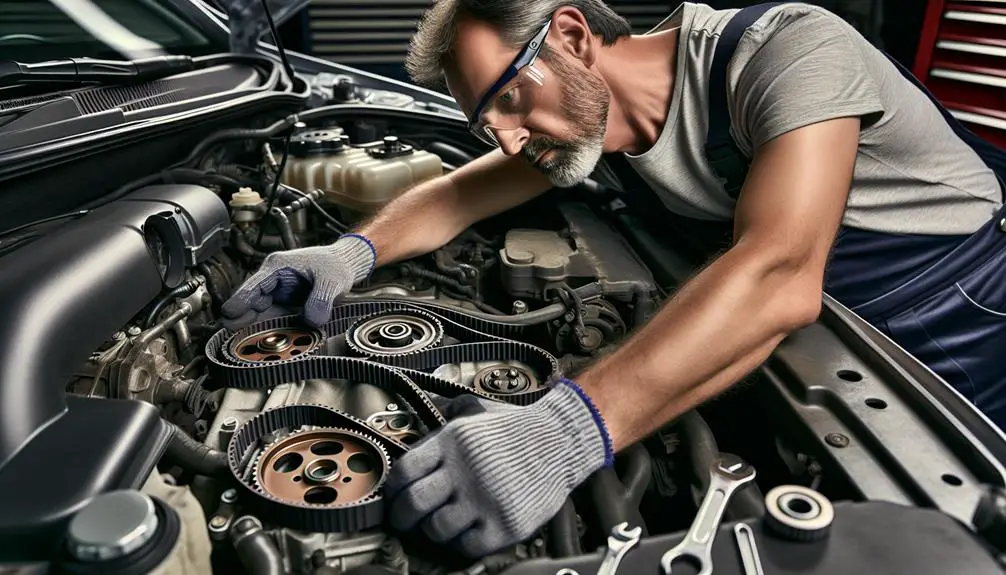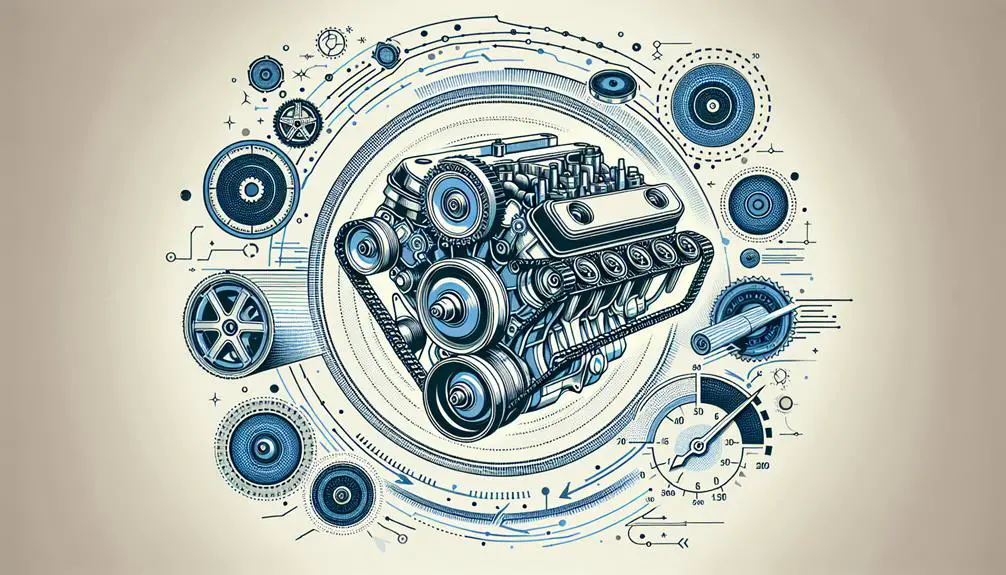Hyundai i30 models vary between having timing belts and chains depending on the year.
While you might think the question of whether Hyundai i30s have timing belts is a straightforward one, the answer varies depending on the model year you're looking at.
You're likely aware that the presence of a timing belt or chain can have a big impact on maintenance schedules and costs.
As we investigate the intricacies of Hyundai i30's timing systems across different years, you'll discover why grasping this aspect is important for both performance and financial planning.
This knowledge not only saves you from potential headaches but also guarantees your vehicle remains in top condition.
Stay tuned to uncover the specifics and how they might impact your car.
Hyundai I30 Timing Basics

Understanding the Hyundai I30's timing belt system is necessary for ensuring the longevity and performance of your vehicle. Hyundai's approach to engine design emphasizes reliability and efficiency, which is evident in the I30's timing belt system. This critical component plays an essential role in synchronizing the engine's camshaft and crankshaft, ensuring that the valves open and close at the correct times during each cylinder's intake and exhaust strokes.
The lifespan of the timing belt in your Hyundai I30 is a proof of the brand's commitment to durability. Typically, you can expect the belt to require replacement between 60,000 and 100,000 miles, though this range can vary based on your driving habits and conditions. It's crucial to adhere to Hyundai's recommended maintenance schedule to prevent premature wear and potential engine damage.
Hyundai's precise engine design, incorporating a timing belt system, contributes significantly to the I30's reputation for reliability. By having a good grasp of the basics of this system and adhering to the recommended maintenance intervals, you're taking an essential step in preserving the performance and longevity of your Hyundai I30.
Model Year Differences
As we analyze the Hyundai I30's timing belt system, it's important to note the variations across different model years that can affect maintenance schedules and performance. These differences aren't just superficial; they stem from the evolution of engine types and adjustments in warranty policies. To give you a clearer picture, here's a breakdown:
- Engine Types: Early models of the Hyundai I30 mainly featured timing belts, particularly in diesel engines, which require more frequent checks and changes. However, later models shifted to chain-driven systems in both petrol and diesel engines, offering longer lifespans and less maintenance.
- Warranty Policies: Hyundai's warranty policies have evolved, with newer models benefiting from longer warranty periods. This change reflects the brand's confidence in the durability of their engine's timing systems.
- Introduction of Turbocharged Engines: Newer models of the I30, especially those with turbocharged engines, often come with timing chains. These engines demand strong timing systems because of higher performance levels.
- Hybrid Variants: The introduction of hybrid models in the I30 lineup brought about significant changes in the timing system to accommodate the unique needs of hybrid powertrains.
Comprehending these differences is key to maintaining your Hyundai I30's engine effectively and ensuring it performs well over its lifespan.
Maintenance and Replacement

To guarantee your Hyundai I30 remains in peak condition, it's vital to adhere to recommended maintenance schedules and understand when timing system components need replacement. The timing belt, a critical part of your engine's synchronization, demands particular attention. Hyundai's engineering emphasizes belt durability, yet even the sturdiest materials wear down over time.
Your I30's service manual specifies the ideal replacement intervals, usually between 60,000 and 100,000 miles, depending on your model year and engine type. Ignoring these guidelines can lead to belt failure, which often results in severe engine damage. Beyond just mileage, factors such as age, wear, and exposure to extreme temperatures can also affect belt integrity.
Proper lubrication plays a crucial role in maintaining belt durability. While the timing belt itself doesn't require lubrication, making sure that surrounding components, like the belt tensioner and pulleys, are well-lubricated minimizes wear and extends the life of the belt. Regular inspections by a qualified technician can catch early signs of wear or lubrication issues before they escalate into costly repairs.
Cost Considerations
Replacing your Hyundai I30's timing belt can greatly impact maintenance costs, particularly if not addressed promptly according to the manufacturer's guidelines. Ignoring this important maintenance step may lead to more significant, costly repairs down the line and can even affect your car's resale value negatively. Hyundai, known for its commitment to reliability and value, emphasizes the importance of regular maintenance to guarantee the longevity and performance of their vehicles, including the I30.
Consider the following cost considerations related to the timing belt replacement:
- Initial Replacement Costs: The upfront cost of replacing a timing belt in a Hyundai I30 can vary. While it might seem steep, it's a necessary investment in your vehicle's health.
- Potential Savings: Regular maintenance can help you avoid more expensive repairs in the future. This includes preventing engine damage that can result from a snapped timing belt.
- Resale Value: Keeping up with scheduled maintenance, including timing belt replacement, can boost your car's resale value. A well-maintained vehicle is always more attractive to potential buyers.
- Warranty Coverage: Adhering to the Hyundai maintenance schedule, including timing belt replacement, is often required to maintain warranty coverage. This could save you money if other issues arise while the vehicle is still under warranty.
Being proactive about your Hyundai I30's timing belt replacement is an investment in your vehicle's future, ensuring it remains reliable, valuable, and covered under warranty.
Performance Impact

Beyond cost considerations, timely maintenance of your Hyundai I30's timing belt greatly influences its performance and efficiency. Neglecting this important component can lead to diminished fuel efficiency and an increase in engine noise, detracting from the overall driving experience. Hyundai is known for its commitment to efficiency and reliability, and adhering to recommended timing belt replacement intervals is key to maintaining these standards in your I30.
| Performance Factor | Impact on Hyundai I30 |
|---|---|
| Fuel Efficiency | Optimized when the timing belt is in good condition, leading to smoother engine operation and better fuel economy. |
| Engine Noise | Reduced significantly with a well-maintained timing belt, ensuring a quieter and more pleasant ride. |
| Engine Lifespan | Extended, as timely timing belt replacement prevents severe engine damage. |
| Responsiveness | Enhanced, as a healthy timing belt ensures the best engine timing, improving acceleration and overall vehicle response. |
Ignoring the health of your timing belt not only compromises fuel efficiency and increases engine noise but also risks significant engine damage. For your Hyundai I30 to perform at its best, keeping up with timing belt maintenance is not just recommended; it's necessary.
Conclusion
In summary, your Hyundai i30 may either have a timing belt or chain, depending on its model year. It's important to follow Hyundai's maintenance schedule for timely replacements to avoid costly repairs.
While the cost may vary, investing in your i30's timing system maintenance greatly influences its performance and longevity. Always consult with a Hyundai specialist for the most accurate advice and service, ensuring your i30 remains in peak condition.